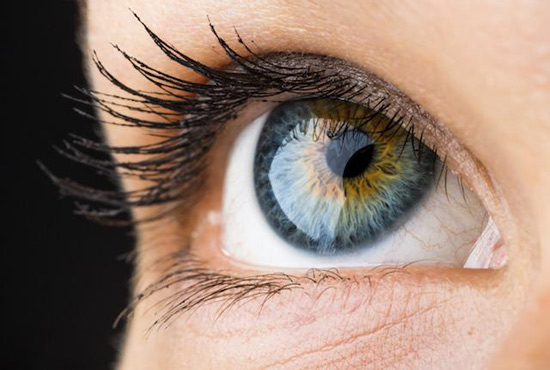当前位置: Language Tips> 双语新闻
Do carrots improve your vision? 15 misconceptions about your eyesight
We can probably all recount at least a dozen weird and alarming things parents, teachers, and older siblings told us about our eyes when we were kids. For instance, we'd be permanently cross-eyed if we didn't stop making those faces at our brother or we'd go blind from reading in the dark. But maybe, just maybe, we could find redemption by eating lots of carrots. Here are a few common myths and misconceptions.
我们都能回忆起自己小时候,父母、老师和哥哥姐姐们曾经告诉过我们的那些有关视力怪异又吓人的事情。比如,如果我们再继续向哥哥扮鬼脸,以后就会变成斗鸡眼,又或者在黑暗中阅读眼睛会瞎掉。但是,如果我们吃很多很多的胡萝卜,也许我们的眼睛还有救。以下就是关于视力的几个常见的误解和迷思。

MYTH #1: IF YOU CROSS YOUR EYES, THEY'LL STAY THAT WAY.
误解1:如果你装成斗鸡眼,那么你将一直是斗鸡眼
Crossed eyes occur when your eyes don't look the same way at the same time. There are six muscles attached to each of our eyes that, guided by signals from the brain, control their movements. When your eyes don't align, the brain gets two different images. Over time, this can cause more serious vision issues. That's a real problem, but it's not caused by making your eyes cross on purpose for short periods of time.
斗鸡眼只有在你的两只眼睛没有同时看向同一个方向的时候才会出现。我们的每只眼睛周围有六块肌肉,它们由大脑中的信号控制。你的两只眼睛若是没有对齐,那么你的大脑就会得到两幅不同的图像。随着时间的流逝,这会造成更加严重的视力问题。不过你短暂地装一下斗鸡眼并不能达到这种效果。
MYTH #2. EATING CARROTS WILL HELP YOU SEE IN THE DARK.
误解2:吃胡萝卜能增强你的夜间视力
Well, carrots certainly aren't bad for your eyesight. They contain plenty of beta-carotene, which your body converts into vitamin A, a crucial vitamin for vision. But carrots don't do anything exceptional for your nighttime vision.
其实胡萝卜对你的视力没有坏处,它们含有丰富的β-胡萝卜素,随后你的身体会将它们变成维他命A,这种维他命对视力至关重要。但胡萝卜无法让你的夜间视力变得超常。
MYTH #3: THE BIGGER YOUR EYES, THE BETTER YOUR EYESIGHT.
误解3:你的眼睛越大,视力越好。
When you're born, your eyeballs are approximately 16 millimeters in diameter, reaching 24 millimeters as an adult. But your eyes getting larger does not necessarily mean that your vision is getting better. In fact, excessive growth in human eyes can cause myopia, or nearsightedness. If the eyeball is too long, the eye's lens can't focus the light in the right part of the retina to process images clearly.
人类刚出生的时候,眼球直径约为16毫米,成年后会达到24毫米。但你的眼睛变大了并不意味着你的视力变强了。事实上,人类眼睛过度增长会造成近视。如果眼球太长,那么眼睛的晶状体就无法将光线聚集在视网膜的正确位置,人类也无法接收到清晰的图像。
MYTH #4: PUPIL DILATION OCCURS ONLY IN RESPONSE TO CHANGES IN LIGHT.
误解4:人眼只有在应对光线变化的时候才会出现瞳孔扩张。
Sexual arousal, solving a complicated mental math problem, fear, and other cognitive and emotional events can provoke changes in pupil size, though the precise reasons why are not yet clearly understood.
我们的情绪和精神状态也会造成瞳孔扩张,性唤起、解决了复杂的数学问题和恐惧等都会让瞳孔大小发生变化,不过人类并未完全了解其中的原因。
MYTH #5: UV RAYS CAN ONLY DAMAGE EYES WHEN THE SUN IS SHINING.
误解5:只有阳光灿烂的时候紫外线才能损害我们的眼睛。
Even on cloudy and foggy days, ultraviolet (UV) radiation can cause eye damage. Years of exposure can increase your risk of developing cataracts.
即便在多云和大雾天气,紫外线也会伤害我们的眼睛,多年持续下来会增大你患白内障的风险。
MYTH #6: WEARING GLASSES TOO MUCH CAN MAKE YOUR EYESIGHT WORSE.
误解6:戴眼镜越久近视越深。
Giving the correct prescription "reduces the progression of myopia."
戴度数合适的眼镜会让“近视度数增长变慢”。
MYTH #7: READING IN DIM LIGHT WILL DIMINISH YOUR EYESIGHT.
误解7:在昏暗的灯光下阅读会损害视力
While reading in semi-darkness may put a temporary strain on your eyes, it's not going to permanently damage your eyesight.
在昏暗的灯光下阅读会暂时让你的眼睛用力过度,但不会永久损害你的视力。
MYTH #8: IF YOUR PARENTS HAVE BAD EYESIGHT, YOU WILL, TOO.
误解8:视力不好会遗传。
You might, of course, because some eye problems are genetic. But there's no guarantee that we will develop the same vision impairments as our parents. One study found that if both parents are myopic, there's a 30 to 40 percent chance that the child is. If only one parent is myopic, the child has a 20 to 25 percent chance, and it's down to 10 percent for kids with non-myopic parents.
有些眼睛问题会遗传,但这并不意味着我们视力受损的程度会与父母一致。有研究发现如果父母双方是近视,那么他们孩子近视的概率为百分之三十至百分之四十。如果父母仅一人近视,那么孩子近视的概率为百分之二十至百分之二十五。若父母双方均不近视,那么孩子近视的概率为百分之十。
MYTH #9: TOO MUCH SCREEN TIME WILL DESTROY YOUR EYESIGHT.
误解9:盯屏幕时间过久会损害视力。
More and more people are complaining of symptoms like dry, irritated eyes after prolonged periods of screen time. The American Optometric Association (AOA) defines this group of symptoms collectively as Computer Vision Syndrome—or Digital Eye Strain—which can be further exacerbated by trying to focus on small screens such as tablets or phones. The AOA recommends following the 20-20-20 rule: Every 20 minutes, take a 20-second break to look at something 20 feet away.
越来越多人长时间盯着屏幕之后会眼干眼涩,美国眼科协会将这些症状统称为计算机视觉综合症,继续盯着小屏幕会让这种症状加重。美国眼科协会建议人们遵循20-20-20规则:每隔二十分钟,休息二十秒钟,并试图看看20英尺以外的东西。
MYTH #10: THE RIGHT "VITAMIN COCKTAIL" CAN PREVENT VISION DECLINE.
误解10:正确的“维他命鸡尾酒”能够防止视力下降。
According to Harvard researchers, vitamins may help slow the progression of macular degeneration, but for people not already suffering from the disease, preventative use of such vitamins didn't appear to make a significant difference.
哈佛的研究人员指出,维他命也许能够减缓黄斑退化的过程,但对于没啥毛病的人来说,用这类维他命预防并没有什么效果。
MYTH #11: DYSLEXIA IS LINKED TO VISION PROBLEMS.
误解11:阅读障碍与视力问题有关。
A recent study from Bristol and Newcastle Universities in the UK found that children with dyslexia were no more likely than others to suffer from common vision problems.
英国布里斯托尔和纽卡斯尔大学最近的研究发现,有阅读障碍的儿童患有眼部疾病的几率并不比其他孩子高。
MYTH #12: IF YOU DON'T TREAT LAZY EYE WHEN YOU'RE A SMALL CHILD, YOU'LL HAVE IT FOREVER.
误解12:弱视不从小开始治疗,就再也治不好了。
While doctors say that the sooner it's treated the better, there are an increasing number of remedies that can help adults as well.
虽然医生说越早治疗越好,但其实随着科技的发展也有越来越多的技术能够帮助弱视的成年人。
MYTH #13: BLIND PEOPLE SEE ONLY DARKNESS.
误解13:盲人看到的只有一片黑暗。
Only 18 percent of people who have visual impairments are totally blind. Most are able to differentiate between light and dark.
只有百分之十八视力严重受损的人永久失明,大部分盲人能够区分光明和黑暗。
MYTH #14: HUMAN VISION IS THE SAME IN SPACE AS IT IS ON EARTH.
误解14:人类在地球和在太空中的视力一样。
Actually, NASA scientists have found that space can impair our vision, though they still aren't sure why.
NASA发现,在太空中我们的视力会受损,但原因不明。
MYTH #15: PEOPLE WHO ARE COLORBLIND CAN'T SEE COLOR.
误解15:色盲的人看不到色彩。
It's quite rare for someone not to see color at all. It's more common for color blind individuals to have difficulty differentiating between certain colors, like red and green, or blue and yellow. And while color blindness is far more common in males than females, it does affect a small percentage of women.
很少有人完全看不到色彩,色盲中较为常见的是人们难以区分特定的颜色,比如红绿和黄蓝。虽然色盲在男性群体中更为常见,但依旧有少数女性深受其扰。
Vocabulary
cataract: 白内障
macular degeneration: 黄斑退化;黄斑部病变
dyslexia: 阅读障碍
英文来源:mentalfloss
翻译&编辑:丹妮
上一篇 : 管理者8大错误 逼走好员工
下一篇 : Vogue杂志找百岁老太当模特
关注和订阅


电话:8610-84883645
传真:8610-84883500
Email: languagetips@chinadaily.com.cn